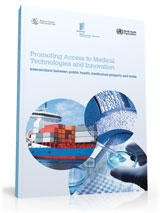 The World Trade Organization, World Intellectual Property Organization, and World Health Organization jointly released a report today on “Promoting Access to Medical Technologies and Innovation: Intersections between public health, intellectual property and trade.”
The World Trade Organization, World Intellectual Property Organization, and World Health Organization jointly released a report today on “Promoting Access to Medical Technologies and Innovation: Intersections between public health, intellectual property and trade.”
The report discusses a number of issues that may be of interest to readers of this blog, including the link between medicine prices and the human right to health; the policy framework surrounding innovation for new medicines; the failure of market based innovation models to spur R&D for neglected diseases; ways that countries can utilize flexibilities in TRIPS to maximize access to medicines; and the role of TRIPS-Plus trade agreements in reducing these flexibilities.
One note that it makes about flexibilities in the TRIPS agreement is that they are not “self actuating” – countries need to proactively implement them in their law. On the topic of FTAs, it briefly lists some previous studies on the impact of TRIPS-Plus provisions on access to medicines:
Some studies have looked at the economic impact of the FTA IPR provisions on the pharmaceutical sector. For example, a 2009 study commissioned by the ICTSD concluded that the CAFTA-DR would lead to an annual price increase for active ingredients in Costa Rica of between 18 per cent and 40 per cent by 2030, requiring increased public spending in the range of US$ 2 million to US$ 3.357 million. The strongest repercussions were expected from standards on patentability criteria and standards on test data exclusivity. A similar 2009 study for the Dominican Republic predicted a modest price increase of 9 per cent to 15 per cent for active ingredients by 2027. It found that the strongest impact by far was to be expected from provisions on data exclusivity. Interestingly, the authors also reported that information asymmetries and government policy imperfections would have a higher impact on prices than regulatory changes in the IP regime. A 2012 study, prepared by two civil society organizations in Colombia, found that the introduction of data exclusivity in exchange for trade preferences in 2002, and later confirmed in the FTA negotiations, has led to an additional expenditure of US$ 412 million. Finally, a 2007 Oxfam Briefing Paper estimated that prices for medicines in Jordan had increased by 20 per cent since the conclusion of the agreement with the United States. Here again, data exclusivity was singled out for delaying the market entry of almost 80 per cent of the generic versions of newly launched medicines between 2002 and 2006, with additional expenditures for medicines estimated at between US$ 6.3 million and US$ 22.04 million.
In his remarks at the report’s release, WTO Diretor General Lamy said that “The report emphasises that innovation and access must be seen holistically — innovation without effective access offers scant public health benefit; yet simply to leverage access to an existing pharmacopeia without encouraging the development of new medicines and new medical technologies would diminish health outcomes. The study points out the importance of the patent system for the pharmaceutical sector, while also identifying alternative incentive mechanisms that seek to enable much needed new products in neglected diseases.”
WHO Director-General Dr Margaret Chan said in a press release that the report “demystifies an intricate and extremely complex landscape of laws and policies and makes them accessible to the non-specialist. In so doing, it sets out a comprehensive and coherent inventory of legal instruments and policy options that can be drawn on to craft measures that meet national public health objectives.”




